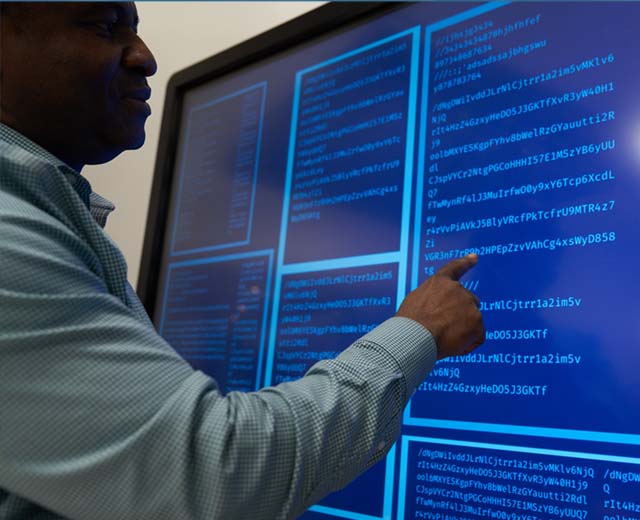This article was originally published December 18, 2023, and was updated January 26, 2026, to reflect changes to UMGC’s criminal justice bachelor’s degree program and salary information.
When we think of criminal justice, we often focus on law enforcement, but the field really entails much more than that. The field of criminal justice is broad and continually evolving. Earning a degree in criminal justice can help prepare you for a variety of career paths, each with its own exciting and rewarding opportunities.
What Does Criminal Justice Entail?
Our criminal justice system has three main branches: law enforcement, the courts, and corrections. Together, they constitute an integrated system designed to protect the public and ensure the safety and viability of society at large.
The job of law enforcement involves investigating crimes, apprehending those responsible, and detaining and charging them. Peace officers are also often tasked with responding to civil unrest, natural and manmade disasters, mental health events, animal complaints, and other public safety concerns. In addition, while others have primary responsibility for such events, police are often called to or are the first on the scene of fires, natural disasters, mental health events, and animal complaints.
The courts, in accordance with state, federal, and constitutional law, adjudicate cases in which individuals are accused of criminal offenses. Corrections provides for the supervision of persons arrested and awaiting trial for criminal offenses, as well as supervising both inside correctional facilities and in the community, those convicted of criminal offenses.
In addition, these branches each contain subcategories. Within law enforcement, cybersecurity protects our valuable IT assets, homeland security focuses on terrorist threats and transnational crime, and forensic investigators collect evidence for identifying and prosecuting criminal offenders. In the courts, attorneys and judges work with victim advocates and other professionals to administer justice. Within corrections are professionals who manage programs that support offenders reentering society.
The private sector also employs individuals to provide functions generally thought of as criminal justice roles. Private police and security personnel can be employed to perform many of the same functions as law enforcement officers, and non-government entities often employ private investigators to conduct activities similar to those of criminal investigators.
These are just a few of the career fields that serve the criminal justice system, and all of these jobs require trained professionals and administrators working across a broad spectrum of public, private, and non-profit organizations.
What Can I Do with a Bachelor’s in Criminal Justice?
The potential occupations available in criminal justice reflect the diversity and complexity of the field, and listing them here would be impractical. However, to give you an idea of how a degree in criminal justice could assist in advancing your career, here are a few job categories to consider:
- Parole and Probation officer: These public officials supervise people who have been sentenced to probation, often first-time and/or nonviolent offenders. They work to prevent recidivism and foster rehabilitation by providing support and counseling and making recommendations to the courts regarding a probationer’s progress. In addition to supervising parolees, these officers conduct investigations, monitor offenders on home detention, and help apprehend offenders who’ve violated their supervision terms. The median salary is $64,520 per year.
- Police Chief: The role of a police chief is to manage a law enforcement agency within a particular jurisdiction and to work with government leaders to develop programs for reducing criminal activity. Police chiefs may also be required to submit policies, reports, and procedures and to give testimony in legal proceedings. The median salary is about $130,500.
- Victim Advocate: Victim advocates accompany and guide crime victims and their family members through criminal justice proceedings. They offer emotional support, advise them of their rights, and assist in securing needed resources. The median annual salary is approximately $69,000.
- Crime Scene Technician: These professionals work with law enforcement to collect evidence left at crime scenes, analyze data, and submit reports on their findings. The national average salary is about $60,000 per year.
- Intelligence Analyst: The role of an intelligence analyst is to use data to assess, mitigate, and neutralize threats and to make recommendations to law enforcement on strategies to counter them. The national average salary is about $62,327 per year, though in the Washington, DC area, salaries average better than $100,000 per year.
- Crime Analyst: These analysts review data that police agencies and their communities deem valuable. They analyze criminals, crime victims, disorder, internal police operations, traffic issues and more to support criminal investigations, prevent and reduce crime, and evaluate police efforts.
Study Criminal Justice at UMGC
The online Bachelor of Science in criminal justice program at University of Maryland Global Campus is uniquely designed to provide you with an understanding of crime and criminal behavior. You'll learn the theory and practice of the criminal justice system as well as the specifics of criminology, law enforcement, courts, corrections, security, and investigation. This degree program can help prepare you to work in a command position in law enforcement or to meet the degree requirements of some law enforcement agencies.
If you’re already a police officer, UMGC offers a criminal justice track specifically designed for you. UMGC offers credit for police academy experience and courses specifically curated for police officers.
There are also a wide variety of other jobs and professions open to criminal justice majors, according to Christopher Swain, director of UMGC’s criminal justice and public safety administration programs.
“In UMGC’s Criminal Justice program, we introduce learners to the most important concepts in criminal justice and enhance the skills of practitioners already in the system,” Swain said. “We focus on developing critical thinking skills and ethical decision-making strategies necessary to meet the professional demands in the field of criminal justice.”
The degree program requires 120 credit hours for completion, and UMGC accepts up to 90 transfer credit hours for your prior coursework, military training and experience, workplace learning, and other sources, so you can save money and graduate sooner.
Rosandra S., who earned a BS in criminal justice from UMGC in 2023, talks about the program and where she intends to take it from there.
"I live in Atlanta, Georgia, and I earned my degree at University of Maryland Global Campus," said Rosandra. "It was an amazing experience. UMGC has an amazing criminal justice program, and they also had an investigative forensics program, which I was really interested in. I'm going back to UMGC in the summer to work on my master's degree in digital forensics."
In addition to our online criminal justice program, UMGC offers a broad range of online undergraduate public safety programs, including bachelor’s degrees in homeland security, legal studies, and public safety administration, as well as an undergraduate certificate in public safety executive leadership. There is also a master’s in criminal justice management for those pursuing command positions in federal law enforcement.
As with most UMGC programs, the criminal justice degree program can be completed entirely online. Select hybrid courses are also available.
Why Choose UMGC?
UMGC was founded more than 75 years ago specifically to serve the higher education needs of working adults and servicemembers like you. We’re accredited by the Middle States Commission on Higher Education and are a constituent institution of the University System of Maryland.
Your courses are taught by our faculty of highly successful and experienced scholar-practitioners who are leaders in their fields. A dedicated UMGC success coach will support you throughout your academic journey in mapping out your education and career goals and assisting with class selection. And wherever you are in your career, you'll always have access to UMGC’s lifetime career services, so you’ll never have to face a job search alone.
If you're looking for a career where you can make a positive difference protecting people and serving the public good, a criminal justice degree from UMGC is a great way to start.
Reference on this webpage to any third-party entity or product does not constitute or imply endorsement by UMGC nor does it constitute or imply endorsement of UMGC by the third party.





